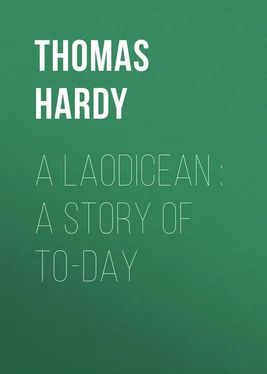Thomas Hardy - A Laodicean - A Story of To-day
Здесь есть возможность читать онлайн «Thomas Hardy - A Laodicean - A Story of To-day» — ознакомительный отрывок электронной книги совершенно бесплатно, а после прочтения отрывка купить полную версию. В некоторых случаях можно слушать аудио, скачать через торрент в формате fb2 и присутствует краткое содержание. Жанр: foreign_antique, foreign_prose, на английском языке. Описание произведения, (предисловие) а так же отзывы посетителей доступны на портале библиотеки ЛибКат.
- Название:A Laodicean : A Story of To-day
- Автор:
- Жанр:
- Год:неизвестен
- ISBN:нет данных
- Рейтинг книги:4 / 5. Голосов: 1
-
Избранное:Добавить в избранное
- Отзывы:
-
Ваша оценка:
- 80
- 1
- 2
- 3
- 4
- 5
A Laodicean : A Story of To-day: краткое содержание, описание и аннотация
Предлагаем к чтению аннотацию, описание, краткое содержание или предисловие (зависит от того, что написал сам автор книги «A Laodicean : A Story of To-day»). Если вы не нашли необходимую информацию о книге — напишите в комментариях, мы постараемся отыскать её.
A Laodicean : A Story of To-day — читать онлайн ознакомительный отрывок
Ниже представлен текст книги, разбитый по страницам. Система сохранения места последней прочитанной страницы, позволяет с удобством читать онлайн бесплатно книгу «A Laodicean : A Story of To-day», без необходимости каждый раз заново искать на чём Вы остановились. Поставьте закладку, и сможете в любой момент перейти на страницу, на которой закончили чтение.
Интервал:
Закладка:
‘It must have been unique,’ said Somerset, in the too-readily controversial tone of the educated young man who has yet to learn diplomacy. ‘I have never seen much undercutting in Perpendicular stone-work; nor anybody else, I think.’
‘O yes – lots of it!’ said Mr. Havill, nettled.
Paula looked from one to the other. ‘Which am I to take as guide?’ she asked. ‘Are Perpendicular capitals undercut, as you call it, Mr. Havill, or no?’
‘It depends upon circumstances,’ said Mr. Havill.
But Somerset had answered at the same time: ‘There is seldom or never any marked undercutting in moulded work later than the middle of the fourteenth century.’
Havill looked keenly at Somerset for a time: then he turned to Paula: ‘As regards that fine Saxon vaulting you did me the honour to consult me about the other day, I should advise taking out some of the old stones and reinstating new ones exactly like them.’
‘But the new ones won’t be Saxon,’ said Paula. ‘And then in time to come, when I have passed away, and those stones have become stained like the rest, people will be deceived. I should prefer an honest patch to any such make-believe of Saxon relics.’
As she concluded she let her eyes rest on Somerset for a moment, as if to ask him to side with her. Much as he liked talking to Paula, he would have preferred not to enter into this discussion with another professional man, even though that man were a spurious article; but he was led on to enthusiasm by a sudden pang of regret at finding that the masterly workmanship in this fine castle was likely to be tinkered and spoilt by such a man as Havill.
‘You will deceive nobody into believing that anything is Saxon here,’ he said warmly. ‘There is not a square inch of Saxon work, as it is called, in the whole castle.’
Paula, in doubt, looked to Mr. Havill.
‘O yes, sir; you are quite mistaken,’ said that gentleman slowly. ‘Every stone of those lower vaults was reared in Saxon times.’
‘I can assure you,’ said Somerset deferentially, but firmly, ‘that there is not an arch or wall in this castle of a date anterior to the year 1100; no one whose attention has ever been given to the study of architectural details of that age can be of a different opinion.’
‘I have studied architecture, and I am of a different opinion. I have the best reason in the world for the difference, for I have history herself on my side. What will you say when I tell you that it is a recorded fact that this was used as a castle by the Romans, and that it is mentioned in Domesday as a building of long standing?’
‘I shall say that has nothing to do with it,’ replied the young man. ‘I don’t deny that there may have been a castle here in the time of the Romans: what I say is, that none of the architecture we now see was standing at that date.’
There was a silence of a minute, disturbed only by a murmured dialogue between Mrs. Goodman and the minister, during which Paula was looking thoughtfully on the table as if framing a question.
‘Can it be,’ she said to Somerset, ‘that such certainty has been reached in the study of architectural dates? Now, would you really risk anything on your belief? Would you agree to be shut up in the vaults and fed upon bread and water for a week if I could prove you wrong?’
‘Willingly,’ said Somerset. ‘The date of those towers and arches is matter of absolute certainty from the details. That they should have been built before the Conquest is as unlikely as, say, that the rustiest old gun with a percussion lock should be older than the date of Waterloo.’
‘How I wish I knew something precise of an art which makes one so independent of written history!’
Mr. Havill had lapsed into a mannerly silence that was only sullenness disguised. Paula turned her conversation to Miss De Stancy, who had simply looked from one to the other during the discussion, though she might have been supposed to have a prescriptive right to a few remarks on the matter. A commonplace talk ensued, till Havill, who had not joined in it, privately began at Somerset again with a mixed manner of cordiality, contempt, and misgiving.
‘You have a practice, I suppose, sir?’
‘I am not in practice just yet.’
‘Just beginning?’
‘I am about to begin.’
‘In London, or near here?’
‘In London probably.’
‘H’m… I am practising in Markton.’
‘Indeed. Have you been at it long?’
‘Not particularly. I designed the chapel built by this lady’s late father; it was my first undertaking – I owe my start, in fact, to Mr. Power. Ever build a chapel?’
‘Never. I have sketched a good many churches.’
‘Ah – there we differ. I didn’t do much sketching in my youth, nor have I time for it now. Sketching and building are two different things, to my mind. I was not brought up to the profession – got into it through sheer love of it. I began as a landscape gardener, then I became a builder, then I was a road contractor. Every architect might do worse than have some such experience. But nowadays ‘tis the men who can draw pretty pictures who get recommended, not the practical men. Young prigs win Institute medals for a pretty design or two which, if anybody tried to build them, would fall down like a house of cards; then they get travelling studentships and what not, and then they start as architects of some new school or other, and think they are the masters of us experienced ones.’
While Somerset was reflecting how far this statement was true, he heard the voice of Paula inquiring, ‘Who can he be?’
Her eyes were bent on the window. Looking out, Somerset saw in the mead beyond the dry ditch, Dare, with his photographic apparatus.
‘He is the young gentleman who called about taking views of the castle,’ said Charlotte.
‘O yes – I remember; it is quite right. He met me in the village and asked me to suggest him some views. I thought him a respectable young fellow.’
‘I think he is a Canadian,’ said Somerset.
‘No,’ said Paula, ‘he is from the East – at least he implied so to me.’
‘There is Italian blood in him,’ said Charlotte brightly. ‘For he spoke to me with an Italian accent. But I can’t think whether he is a boy or a man.’
‘It is to be earnestly hoped that the gentleman does not prevaricate,’ said the minister, for the first time attracted by the subject. ‘I accidentally met him in the lane, and he said something to me about having lived in Malta. I think it was Malta, or Gibraltar – even if he did not say that he was born there.’
‘His manners are no credit to his nationality,’ observed Mrs. Goodman, also speaking publicly for the first time. ‘He asked me this morning to send him out a pail of water for his process, and before I had turned away he began whistling. I don’t like whistlers.’
‘Then it appears,’ said Somerset, ‘that he is a being of no age, no nationality, and no behaviour.’
‘A complete negative,’ added Havill, brightening into a civil sneer. ‘That is, he would be, if he were not a maker of negatives well known in Markton.’
‘Not well known, Mr. Havill,’ answered Mrs. Goodman firmly. ‘For I lived in Markton for thirty years ending three months ago, and he was never heard of in my time.’
‘He is something like you, Charlotte,’ said Paula, smiling playfully on her companion.
All the men looked at Charlotte, on whose face a delicate nervous blush thereupon made its appearance.
‘’Pon my word there is a likeness, now I think of it,’ said Havill.
Paula bent down to Charlotte and whispered: ‘Forgive my rudeness, dear. He is not a nice enough person to be like you. He is really more like one or other of the old pictures about the house. I forget which, and really it does not matter.’
Читать дальшеИнтервал:
Закладка:
Похожие книги на «A Laodicean : A Story of To-day»
Представляем Вашему вниманию похожие книги на «A Laodicean : A Story of To-day» списком для выбора. Мы отобрали схожую по названию и смыслу литературу в надежде предоставить читателям больше вариантов отыскать новые, интересные, ещё непрочитанные произведения.
Обсуждение, отзывы о книге «A Laodicean : A Story of To-day» и просто собственные мнения читателей. Оставьте ваши комментарии, напишите, что Вы думаете о произведении, его смысле или главных героях. Укажите что конкретно понравилось, а что нет, и почему Вы так считаете.












